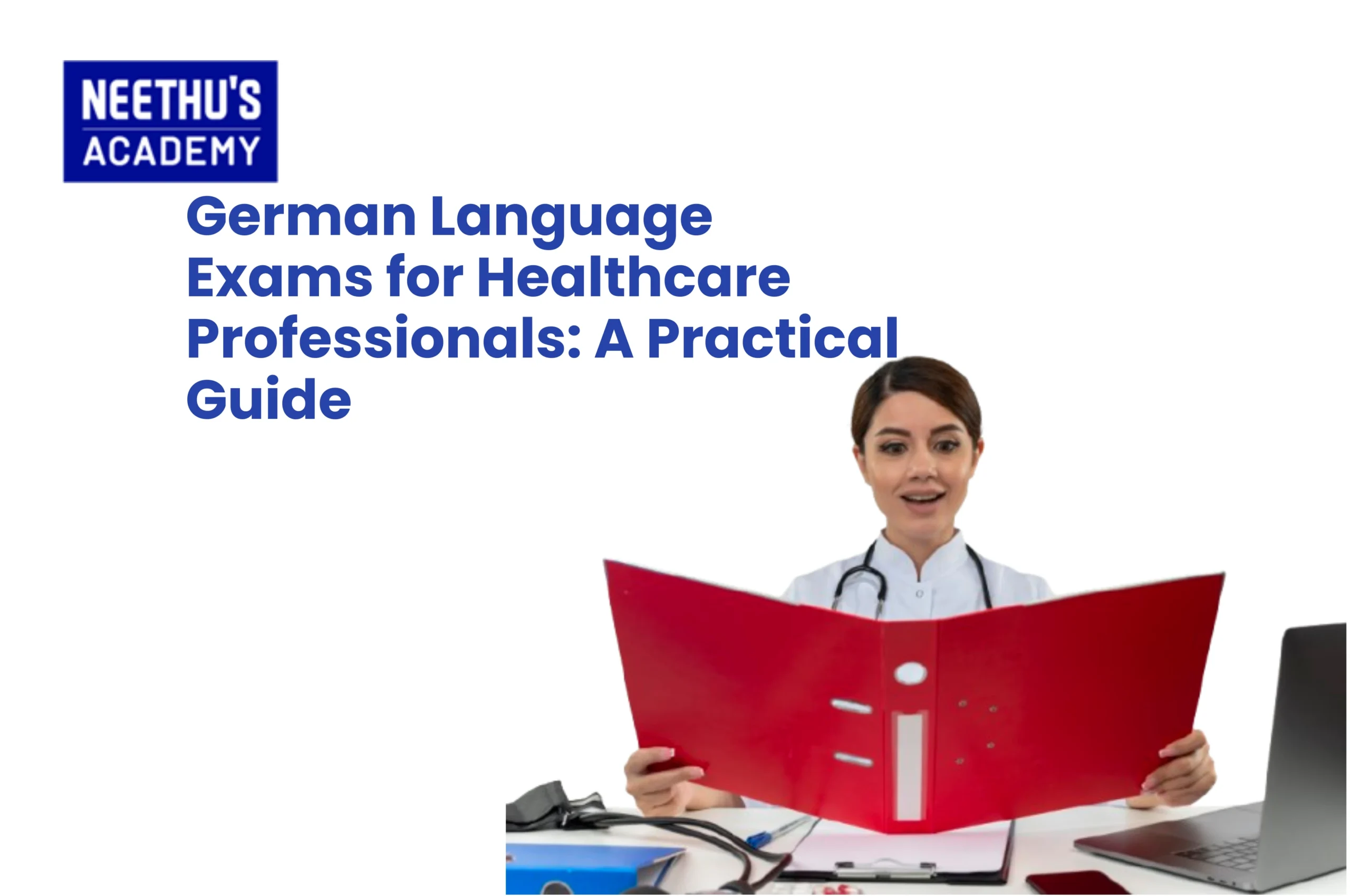Learning German can be the way to unlock great opportunities in career advancement, academic pursuit, or even cultural exploration. However, it is…

German Language Exams for Healthcare Professionals: A Practical Guide
For healthcare professionals who aspire to a career in Germany, Austria, or Switzerland, fluency in the German language is more than a nicety—it’s a key to patient safety. In healthcare, communication is critical, particularly when discussing medical histories, diagnoses, and emotional interactions. The German exam for healthcare professionals verifies that doctors and nurses can comprehend and react aptly in the clinical environment and uphold the high standards of healthcare as required in German-speaking nations. Knowledge of German also offers great career prospects, better pay, and a secure work-life balance in Europe’s highly developed healthcare structures.
Exam Levels Needed for Nurses and Doctors
Healthcare practitioners are required to achieve certain German language test levels to be professionally recognised and licensed outside their home countries. These vary marginally by country and occupation.
Nurses:
The majority of German states demand B2-level German proficiency, which is certified through a reputable test like Goethe-Institut, TELC, or ÖSD. This level ensures that the nurse is able to communicate effectively with patients, comprehend hospital directions, and take part in team discussions.
Doctors:
Physicians typically require C1-level proficiency, as they deal with intricate consultations, need to clarify medical procedures, and are required to prepare lengthy reports. Nevertheless, certain states can permit B2 certification initially, on the condition that candidates take a C1 Medizin subsequently for professional registration.
Substantively, German B2 for nurses and German C1 for physicians abroad are typical standards for professional recognition in the majority of German-speaking nations.
Overview of B1, B2, and C1 Medical Exams
The German language tests for health professionals are graded based on the Common European Framework of Reference for Languages (CEFR). Each level assesses various aspects of understanding, grammar, and medical communication skills.
B1 Level – Intermediate Proficiency
- Aims at natural communication in everyday life and at work.
- Ideal for candidates starting their way towards professional qualification.
- Includes basic communication with patients, reading prescriptions, and interpreting regular hospital conversations.
- Only accepted for initial internships or language visa use—not for licensure.
B2 Level – Upper Intermediate (Nursing Standard)
- Mandatory for nurses who wish to work in Germany or Austria.
- Assesses the capacity to deal with standard hospital encounters—knowing patient histories, outlining symptoms, and recording care.
- Comprises speaking, listening, reading, and writing subtests specific to medical situations.
- TELC Deutsch B2 Pflege is one of the most well-known exams for nursing professionals.
C1 Level – Advanced (Doctor's Requirement)
- For doctors overseas who wish to work in German-speaking hospitals.
- The C1 Medizin or Fachsprachprüfung (FSP) is the medical-level test dealing with clinical communication.
- The candidates are evaluated on their skills of coping with doctor-patient interactions, delivering case histories, and professional communication with other professionals.
The C1 test tests fluency, precision, and coping with complicated discussions and medical paperwork.
Focus on Medical Vocabulary in Exams
Mastering medical German vocabulary is one of the most difficult aspects of the German exam for healthcare professionals. Unlike general language exams, medical exams focus on vocabulary that is actually found in hospitals.
The most important areas are:
- Anatomy and physiology terms (e.g., Herz, Leber, Lunge)
- Medical procedures (Untersuchung, Blutprobe, Röntgenbild)
- Symptoms and conditions (Kopfschmerzen, Atemnot, Entzündung)
- Patient communication phrases (Wie fühlen Sie sich heute?, Haben Sie Schmerzen?)
- Professional interactions (Befundbesprechung, Konsil anfordern)
The majority of exam tasks mimic authentic hospital scenarios—such as describing drug side effects, writing up patient details, or reporting back to more senior physicians. Medical terminology learned from case studies, role-plays, and simulated consultations benefits candidates to achieve fluency and confidence.
Country-Specific German Language Requirements
Although German language competence is a requirement throughout Europe, the country-specific required level differs.
Germany:
- Nurses: B2 level (TELC B2 Pflege or Goethe B2 accepted).
- Physicians: C1 Medizin or Fachsprachprüfung for professional title.
The federal states (Bundesland) can have their own approval authorities (Approbationsbehörde), so regional requirements should be checked.
Austria:
- Nurses: B2 level minimum required.
- Physicians: C1 is recommended, but B2 can be okay as a temporary solution.
Examinations such as ÖSD or Goethe certificates are generally accepted.
Switzerland:
- The language requirements vary according to canton (region).
- The majority of German-speaking cantons require B2 or C1 proficiency for healthcare professionals.
- A few hospitals will consider a mix of general and professional German qualifications.
Having an understanding of these country-specific German language requirements assists candidates in organizing the proper exam and documentation for their destination of choice.
Preparation Strategies and Timelines
Preparation for the German exam for healthcare professionals necessitates a systematic approach—particularly for non-native healthcare professionals working full-time or completing exam recognition documentation. Here’s how to prepare efficiently:
1. Establish a Realistic Timeline:
The majority of learners take 6–12 months to move from A2 to B2 level. Physicians preparing for C1 might require a further 3–4 months.
2. Select the Suitable Course:
Take a medical German coaching course that specialises in healthcare situations, patient conversations, and clinical writing exercises.
3. Daily Speaking Practice:
Prioritise medical role-plays—patient interviews, case reports, and phone conversations with physicians.
4. Utilise Specialised Texts:
Practice with texts such as TELC Deutsch B2 Pflege practice books or C1 Medizin study guides. Watch German medical programs or listen to healthcare podcasts.
5. Join Study Groups:
Online or face-to-face study groups enhance motivation and fluency through interaction with peers.
6. Take Mock Tests Regularly:
Mimic exam situations to enhance timing, accuracy, and familiarity with actual test formats.
8. Stay Consistent:
Regular exposure—even 30 minutes of intensive learning—instils long-term language retention and fluency.
By following these steps, candidates can confidently prepare for their German B2 or C1 medical exams and comply with the licensing requirements abroad.
Conclusion
Choosing the appropriate German exam for healthcare professionals rests upon your career aspiration and destination country. Nurses would target B2-level competency, while physicians typically need C1 level to be fully recognized. Effective communication skills don’t just add credibility to your professional profile but also enable you to easily fit into a German-speaking healthcare setup. It is possible to reach B2 or C1 competency with persistence, practice, and proper training—so go ahead, take the first step toward a successful European medical career.
Frequently Asked Questions
B2 level is the general requirement for nurses who practice in German-speaking nations.
The majority of physicians require C1 Medizin, although B2 can be accepted temporarily while obtaining the license.
Yes, they accept German language qualifications such as Goethe, TELC, and ÖSD.
Yes, with regular study and proper guidance, it is possible to achieve B2 in 6 months for diligent learners.
Related Blogs
- All Posts
- German
Learning German pronunciation is a critical stepping stone in mastering the language. It makes speaking easier and more natural to those beginners…
The German language opens the doors to interesting academic, professional, and cultural opportunities. Being one of the most spoken languages in Europe,…
Course Enquiry
Latest Posts
- All Posts
- canada
- CBT
- DELF
- DHA
- French
- GENERAL
- German
- Haad
- IELTS
- IQN NEW ZEALAND
- MOH
- NCLEX-RN
- NHRA
- OET
- OSCE
- Pearson Vue
- PROMETRIC
- PTE
- TOEFL
- Back
- NCLEX - NGN
- Back
- OET FOR PHYSIOTHERAPIST
- OET FOR PHARMACIST
- OET FOR DOCTORS



